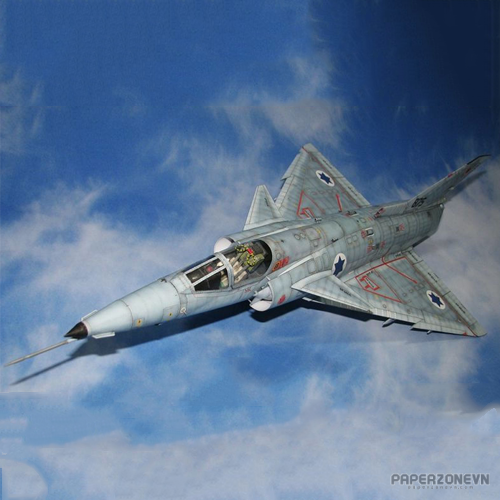- Thumbnail
-

- Resources
- Received from the internet.
- Author
- Unknown.
- Printed File Format
- JPG
- Page(s)
- 21
- Instruction Format
- Image
Sponsored:
Sponsored 2:
Jet Fighter ném bom Kfir C.2 Papercraft
The project that would ultimately give birth to the Kfir can be traced back to Israel's need for adapting the Dassault Mirage IIIC to the specific requirements of the Israeli Air Force (IAF).
The all-weather, delta-winged Mirage IIICJ was the first Mach 2 aircraft acquired by Israel from then-close ally France, and constituted the backbone of the IAF during most of the 1960s, until the arrival of the Douglas A-4 Skyhawk and, most importantly, the McDonnell Douglas F-4 Phantom II, by the end of the decade. While the Mirage IIICJ proved to be extremely effective in the air-superiority role, its relatively short range of action imposed some limitations on its usefulness as a ground-attack aircraft.
Thus, in the mid-1960s, at the request of Israel, Dassault Aviation began developing the Mirage 5, a fair-weather, ground-attack version of the Mirage III. Following the suggestions made by the Israelis, advanced avionics located behind the cockpit were removed, allowing the aircraft to increase its fuel-carrying capacity while reducing maintenance costs.
By 1968, Dassault had finished production of the 50 Mirage 5Js paid for by Israel, but an arms embargo imposed upon Israel by the French government in 1967 prevented deliveries from taking place. The Israelis replied by producing an unlicensed copy of the Mirage 5, the Nesher, with technical specifications for both the airframe and the engine obtained by Israeli spies.

The project that would ultimately give birth to the Kfir can be traced back to Israel's need for adapting the Dassault Mirage IIIC to the specific requirements of the Israeli Air Force (IAF).
The all-weather, delta-winged Mirage IIICJ was the first Mach 2 aircraft acquired by Israel from then-close ally France, and constituted the backbone of the IAF during most of the 1960s, until the arrival of the Douglas A-4 Skyhawk and, most importantly, the McDonnell Douglas F-4 Phantom II, by the end of the decade. While the Mirage IIICJ proved to be extremely effective in the air-superiority role, its relatively short range of action imposed some limitations on its usefulness as a ground-attack aircraft.
Thus, in the mid-1960s, at the request of Israel, Dassault Aviation began developing the Mirage 5, a fair-weather, ground-attack version of the Mirage III. Following the suggestions made by the Israelis, advanced avionics located behind the cockpit were removed, allowing the aircraft to increase its fuel-carrying capacity while reducing maintenance costs.
By 1968, Dassault had finished production of the 50 Mirage 5Js paid for by Israel, but an arms embargo imposed upon Israel by the French government in 1967 prevented deliveries from taking place. The Israelis replied by producing an unlicensed copy of the Mirage 5, the Nesher, with technical specifications for both the airframe and the engine obtained by Israeli spies.

Sponsored: Google Advertising
